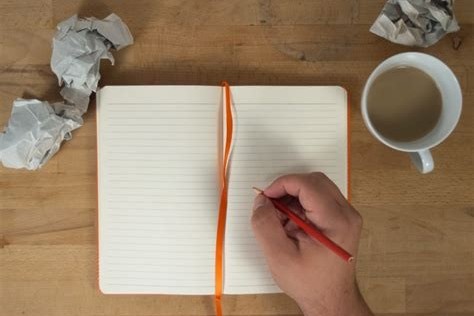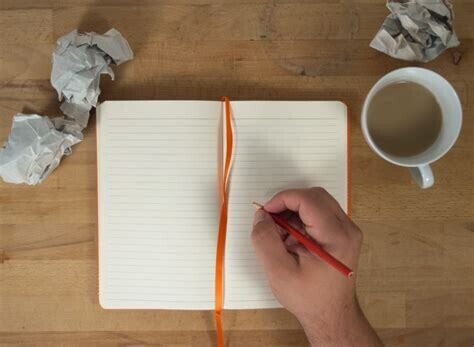
posted 30th January 2022

‘Dad, what is a notebook? Mum, what is a pencil?’
We’re not quite there yet. After all, public exams - involving, in many subjects, lengthy and complex essays - are still handwritten. None the less, we live in an increasingly digital world. So it might seem a bit odd to be suggesting that debaters equip themselves with notebooks, pencils and pens. However, there are good reasons for you to have and use these relics of a bygone age.
The first reason is pragmatic. In a short prep debate you are not allowed to use any digital media while preparing. You are, however, allowed as many hard copy resources as you can carry. So why not make the most of this allowance?
The second reason is to do with your own understanding. It is very easy to cut and paste text into a document, to scan articles, to print stuff off and highlight. Too easy, in fact. This way of interacting with text makes it much less likely that you will understand and retain the material. If, on the other hand, you have to put in the hard labour of reading a text and then recreating its key points in your own words by making symbolic marks on a piece of paper with carbon or ink, you will engage with what you have read much more.
So, what sort of notebooks should debaters use and how should they use them?
I suggest you have three. Yes, three. There are (at least) three different functions for a debating notebook, and it will be much easier to access your material (particularly in the heat of an intensive preparation session) if each function has its own notebook allocated to it.
Notebook One - the live book
This is the one you use for brainstorming your ideas in prep time; for planning your speech; for jotting down rebuttals to the previous speech; for scribbling notes to your debate partner in the middle of her speech. It’s going to be a bit messy, just as debates often are. A notebook is still better than random bits of paper, though. It can provide valuable evidence for the post-competition analysis with your coach. Looking back at your notes a few days after the debate can show you how you prepared, how you responded to the other side, where your thinking was going and what you could have done better.
Remember to head up each event so you can remember the context of the debate, e.g.
- Debating For Everyone Junior Shield, Round One
- Neasden Academy 1/2/22
- This house would reduce the voting age to 14
- Opening Opposition
See this article on how to prepare for a debate for advice on how best to use this notebook.
Notebook two - the skills book
Use this book in slower time to make notes on the key skills needed for successful debating, e.g. how to prepare, how to structure arguments, how to rebut etc. You can find information on all these topics in other articles on this website, and also in The Debating Book. Don’t just copy them out, though. Put them in your own words, with bullet points, spider charts, even images; whatever helps you to learn and remember. Refer back to your notes often, and particularly just before a big competition. Even though you may not be able to revise the topics you will be debating, time spent revising the key skills will never be time wasted.
This notebook can (and should) be a bit tidier. You can organise it with a contents page and index tabs for different sections.
Notebook three - the knowledge book
Debaters don’t just need to know how to debate. They also need to know (and care) about the world. They need to be constantly reading newspapers, watching and listening to news and discussion programmes. But they also need to be interested not just in where we are now, but in how we got here, because nothing comes out of nowhere. So, if you're debating immigration policy, you’ll be on much stronger ground if you know not just about the government’s latest announcement on asylum seekers, but also about the arrival of West Indian immigrants on the Empire Windrush in 1948 and how they were received; about Enoch Powell’s inflammatory ‘rivers of blood’ speech in 1968 and why he was so popular; about how and why Ugandan Asians came to Britain in 1971, and how they changed British society; and about how (and why) we joined the Common Market in 1973, and how (and why) we left the EU in 2020, and what that meant for immigration policy. How to get all that knowledge is another topic for another article (partly covered in this article on how to use the media, but here are some thoughts on how to organise it.
Divide your notebook into categories, separated by index tabs. Helpful categories might be:
- Politics
- Education
- The economy
- Healthcare
- Ethical issues
- Technology
- Identity
- Faith and religion
- Environment
- Crime, punishment, violence
... you may come up with some more of your own.
So if, for example, you read an interesting article on moves in the USA to restrict abortion rights, flip to your ‘Ethical issues’ section and make a few notes (in your own words, remember, to make it yours). If you decide to dive a bit deeper and find out how abortion came to be legalised across the USA in 1973, you can make some notes on Roe vs Wade in the same section. Then, if you find yourself taking part in a debate about abortion rights, you can (entirely legally) refresh your memory, and perhaps educate your debate partner, with some useful facts to bolster your arguments.
What to do when your notebooks are full up? Buy some more, that’s what. Eventually you might have a whole shelf full of them. But that will also make it more likely that you will have a head full not only of techniques and skills for debating, but also facts, ideas and thoughts about the world. This will make you both a better debater and a better citizen. If the other side look a bit scared when they see the pile of notebooks in front of you during a debate, well, that’s no bad thing either.





